
The Nazi German Government, on September 13, 1935, announced two new laws; The Reich Citizenship Law and The Law for the Protection of German Blood and German Honor. These laws, over time, became known as the Nuremberg Laws or Nuremberg Race Laws.
The laws were first announced at a Nazi Party rally held in the German city of Nuremberg, which influenced the name Nuremberg racial laws. The Nazis enacted these Nuremberg Laws because they wanted to put their beliefs about race into law and set them in stone.
The Nazis ardently believed in the false theory that the world is divided into distinct races that are not equally strong and valuable. The Nazis also considered Germans to be members of the supposedly superior “Aryan” race, more intelligent and powerful than the rest, especially the Jews.
The Germans also believed that this ‘Aryan’ race was the most vital and most valuable race of all. This belief also extended to the Jews, who they saw as the most inferior of all races, believing that associating with them threatened the superiority of their race.
As a result of how the Jews were perceived, the Jews felt they had to separate the Jews from other Germans so that they could protect and strengthen Germany. The Nuremberg Laws were crucial for serving this purpose.
The Reich citizenship law defined a citizen as a person who is “of German or related blood.” This, therefore, took away the possibility of Jews to contest for political positions, as was the aim of the Nazi party. This law also considered Jews not to be full citizens of Germany, ridding them of any political rights.
The Law for the Protection of German Blood and German Honor, on the other hand, was a law set in place to ban intermarriages and sexual relations between people “of German or related blood” and Jews.
The nazi government saw this as blasphemy because it led to mixed-race children that, according to the Nazis, would undermine the purity of the German race.
The Nuremberg laws defined a person with three or four Jewish grandparents as a Jew. A grandparent was considered Jewish if they belonged to the Jewish religious community, making it more about religious affiliation than racial traits.
These laws grouped some people in Germany as “Mischlinge”. According to law, the Mischlinge were mixed, neither German nor Jewish. These were people who had one or two Jewish grandparents. The Nazi regime also made it compulsory for people to prove the racial identities of their grandparents.
Over time, the Nuremberg Laws started applying to groups that weren’t Jewish, like Romas, black people and their descendants. The Nuremberg laws served as a first step to creating multiple anti-semantic and racist laws that justified the persecution of Jews.

